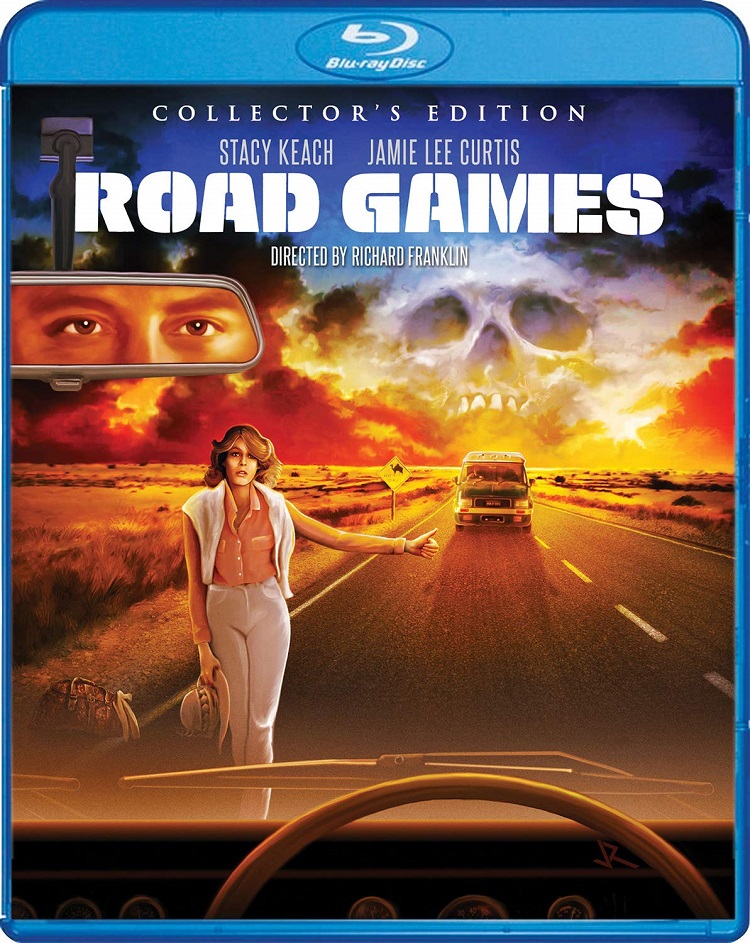
From scene one of Road Games, the film grabs us. There is an extended moment, however, when we realize we are in the hands of a director who knows exactly what he wants and has the chops to pull it off, and it comes several minutes into the picture:
Stopping at a diner in the Australian outback to fuel up and stretch his legs—but most importantly call the cops—a well-read trucker, Quid (Stacy Keach), tries in vain to be heard over the other customers. Reception on the line is bad. Shifty-looking dudes play a loud tune on the jukebox, and a game of pool. The proprietor gives Quid some lip about Quid’s pet dingo, an animal seen as fair game for bounty in this part of the outback. Slowly, and with methodical ease, director Richard Franklin’s camera pans around the establishment. Concerned that a serial killer is on the same highway he is, aware of his curiosity, Quid drowns in the din. The world, it would seem, is indifferent to his situation. To this point, he has won us over with charm and wit—with his protective, companionable nature. But we are now firmly on his side, alone with him and his dingo. The film’s sense of place—and its engineering of sympathy for the main character, an increasingly unlucky voyeur—is total.
And Quid’s troubles have only begun.
Meet Road Games, a crisply shot and edited corker that ranks among Australia’s finest suspense films. Many people call it an Ozploitation classic; but I would go so far as to say it is one of the premier thrillers of the early ‘80s, a film that even today feels overlooked and underappreciated.
The story is simple, and so is the setup. On his way to load a semi of pig hides in Melbourne, Quid decides to rest at a motel, only to lose the last vacancy to a couple—a man and a woman. Like Quid, we assume this is no ordinary couple, but a hookup instead. But for one key moment, Quid is our point of reference; we stay with him as he settles in the truck, watching the room that could have been his light up. Franklin segues briefly from this perspective to show us the woman is in fact in grave danger, Quid none the wiser. Cut to the morning after: upon waking, Quid sees the man in the room peering down at a black trash bag the garbage collector will soon collect. Quid suspects something bad has happened. We, of course, know for sure. This brush with death leads to an escalating series of road games, cat and mouse maneuvers between Quid and the man he suspects is butchering bodies across the Nullarbor Plain. The journey climaxes in a go-for-broke confrontation in an alleyway. To the very last, we stick with Quid and his dingo; and his budding romance with a hitchhiker, Hitch (Jamie Lee Curtis), ups the stakes in surprising and familiar ways.
Like The Texas Chain Saw Massacre (1974), Road Games is fundamentally a black comedy. Until it becomes unavoidable, the threat of violence looms around the bend. Curiously, we see no actual bloodshed (the film has a PG rating). Franklin and screenwriter Everett De Roche (Long Weekend, Patrick, Razorback) are more interested in the way these nomads of the highway, these solitary figures, slake their curiosity. Alfred Hitchcock’s Rear Window is the film’s biggest influence—from the beautiful, nosy girl who flirts with danger, to the idea of a killer undetected by everyone except the hero. As noted, the film has a sporty sense of humor. The banter between Quid and Hitch is lively. This is not a Howard Hawks kind of screwball, though. That would have been wrong for this picture. These lonely, lost souls recognize in each other a mutual love of movement, of adventure. Both like to engage in repartee, but the dialogue avoids cheap innuendo, avoids any obvious attempt to push exposition on us.
Keach is wonderful; but Curtis, who looks great, is the real casting surprise. She made Road Games at the height of her reign as Scream Queen. At first, I found her beauty distracting, ill-fitting. But as I learned more about her character, I realized I was wrong. As A Fish Called Wanda and this year’s Knives Out prove (to cite just two other films), Curtis can do lovely comedic turns. Some of that talent is visible in Road Games. Her easy manner—the way she lights up around Keach—reveals an actor beginning to carry herself with confidence. Two years after she made this film, she starred in Trading Places, a capital-C Comedy that left no doubt as to her whip-smart presence.
Spectacle is the last thing Franklin seems to have on his mind; and while he is no Brian De Palma (he of the sometimes splashy Hitchcockian set-piece), he still gives us a visually striking film that rarely calls attention to itself, that aims to be, and succeeds as, a faithful but fresh spin on the master’s line. Without distracting us, the Rear Window elements chime in like a familiar song. In other hands, contemporaneous or otherwise, the movie could easily have been a grisly gore fest, eschewing the lighter touch Franklin brings to bear. Slasher films (let alone graphic horror films in general) were all the rage in 1981. How odd, how refreshing, that Road Games plays a different game, using the entire course of the film to deliver its one true gross-out.
In its modest and good-humored attempt to play with genre and offer us likeable characters who are not simply tools for plot, Road Games is a gem.
The Scream Factory Blu-ray is chock full of special features, including interviews with key personnel (Keach, Curtis, Franklin, De Roche) and commentary by assorted members of the crew (cinematographer Vincent Morton, production coordinator Helen Watts, and costume designer Aphrodite Kondos).